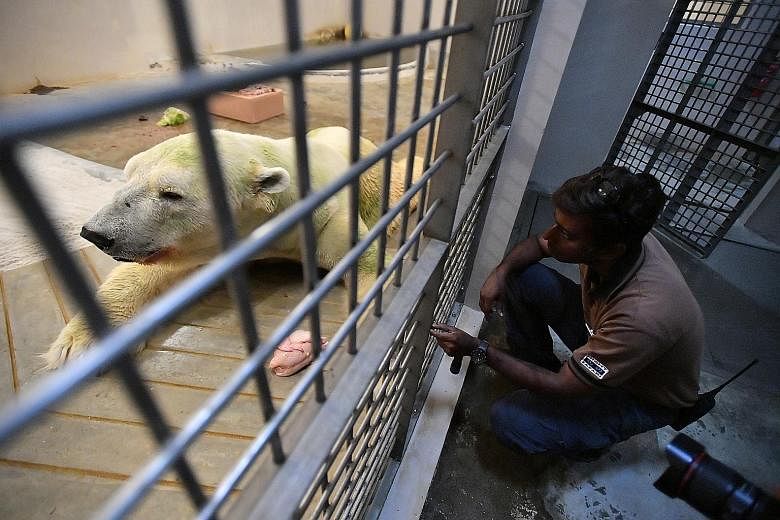Singapore's beloved polar bear, Inuka, may be put down on Wednesday if a medical examination on that day reveals that the 27-year-old animal is suffering.
The male bear has arthritis, dental issues and occasional ear infections. Since the beginning of the year, it has also been lethargic and inactive, spending most of its days prone and unmoving, and has been on a constant cocktail of painkillers.
The Singapore Zoo said yesterday that a team of veterinarians, zoologists and the zoo's animal welfare team will evaluate if treatment can be modified to save Inuka, the only polar bear to be born in the tropics.
Dr Abraham Mathew, assistant director of veterinary services, said: "If we feel that he is improving and can do better with medication, we will reverse the anaesthesia. But if we feel that his welfare is compromised and his condition is going to continue deteriorating, then we will have to let him go peacefully."
Inuka was found to be in declining health following an initial full medical examination on April 3.
It has surpassed the average life expectancy of polar bears, which typically live 15 to 18 years in the wild and 25 years under human care.
Dr Mathew said Inuka usually has one major full-body check-up a year. The bear is anaesthetised during the check-up, allowing vets to conduct a thorough examination.
"It entails blood work, radiography, ear and eye examinations and general physical examinations," said Dr Mathew, who has worked at the zoo for 20 years.
This is on top of regular weekly or bi-weekly visual medical assessments that Inuka's keepers conduct. The next full check-up was initially scheduled to take place in June.
Said Dr Mathew: "Since January, keepers have noticed that he is resting more, moving much less. They monitor him very closely through CCTVs, and it was just becoming worse."
Ensuring the best comfort for Inuka
He added: "That is when we realised we had better do something to find out what was going on."
Deputy head keeper Mohan Ponichamy, 41, recalls when Inuka's keepers first realised that something was wrong.
"Usually, every morning, Inuka will be up and ready to greet us in his den when we arrive," he said. "But there was this one morning in December 2016, when he was just unresponsive when we came. He slept the whole day and only woke up at six in the evening."
Keepers had to resort to coaxing the bear to eat. Since then, Inuka has been placed on constant painkillers.
MrPonichamy said that despite declining health, Inuka remains as sharp and stubborn as ever. Inuka's keepers often place pills within pieces of meat to ensure that it consumes its medication but the bear will pretend to chew the meat while secretly removing the pills.
"He is really smart and he really keeps us on our toes," added Mr Ponichamy.
Inuka is now on palliative care, with its carers aiming to "make him as comfortable as possible". If its condition worsens, a decision will be made to put it down humanely on the same day of his second full medical check.
Said Dr Mathew: "If medications are taken off, his quality of life would be totally compromised. He would eventually pass away naturally, but in a very undesirable manner that is both painful and uncomfortable.
"One criterion of animal welfare is to alleviate pain.
"We will not allow an animal to suffer. It is just not responsible."
Mr Ponichamy added: "For this period of time, we are just taking it day by day. Whatever the outcome is, we are prepared."



